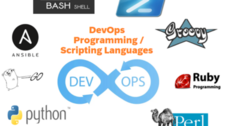Languages and DevOps: Can’t be Contained

- Languages: This likely refers to programming languages, which are essential tools in software development and operations. The diversity and evolution of programming languages reflect the constant growth and adaptation in the tech world.
- DevOps: A combination of development (Dev) and IT operations (Ops), DevOps is a set of practices that automate and integrate the processes between software development and IT teams. It’s about unifying and automating processes, which leads to faster development and deployment of software.
- “Can’t be Contained”: This phrase suggests that both the evolution of programming languages and the practices of DevOps are dynamic and cannot be restricted or confined. They are constantly evolving, growing, and adapting to new challenges and technologies.
The growing influence of containers, microservices, and cloud-native computing is changing the way developers think about building and deploying applications. As a result, the need for a more flexible and dynamic approach to DevOps is increasing. This is where the role of languages comes into play.
In the past, DevOps teams were largely reliant on a limited set of languages, such as Bash and Python. However, as the complexity of applications has increased, so has the need for a wider range of languages. Today, DevOps teams are using a variety of languages, including Go, Rust, and Node.js, to build and manage their applications.
This change is being driven by several factors, including the need for higher performance, the need for greater flexibility, and the need for a more collaborative environment. Go, for example, is a high-performance language that is well-suited for building microservices. Rust is a memory-safe language that is becoming increasingly popular for writing systems software. And Node.js is a JavaScript runtime that is widely used for building web applications.
The use of a wider range of languages is also leading to a more collaborative environment. In the past, DevOps teams were often siloed, with developers working in one language and operations teams working in another. However, as the use of multiple languages has become more common, teams are finding that they need to work together more closely. This is leading to a more collaborative and productive environment.
The changing landscape of languages in DevOps is having a number of benefits. First, it is leading to the development of more innovative and scalable applications. Second, it is making it easier for teams to collaborate and work together. And third, it is leading to a more efficient and productive development process.
As the use of containers, microservices, and cloud-native computing continues to grow, it is likely that the role of languages in DevOps will continue to evolve. In the future, we can expect to see even more languages being used in a wider range of ways. This will continue to drive innovation and improve the way that applications are built and deployed.